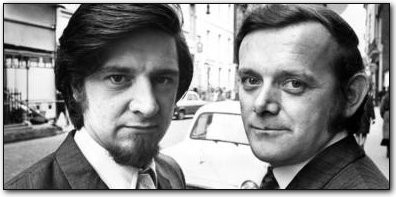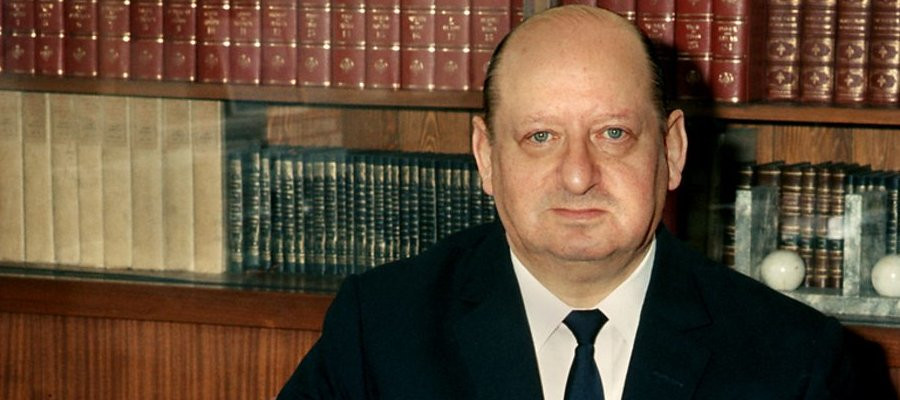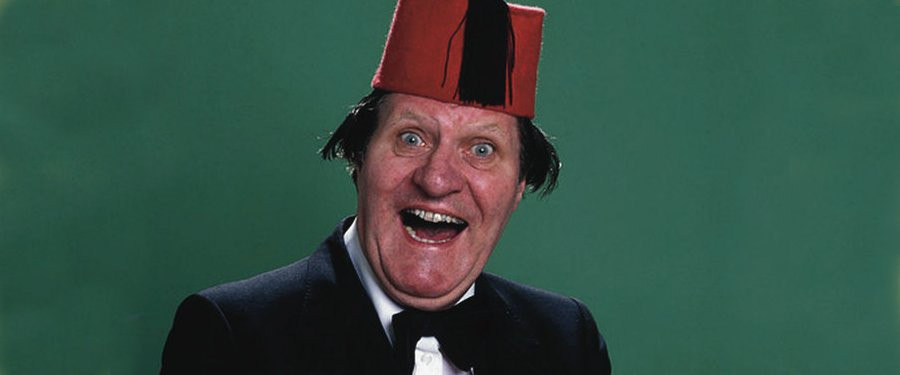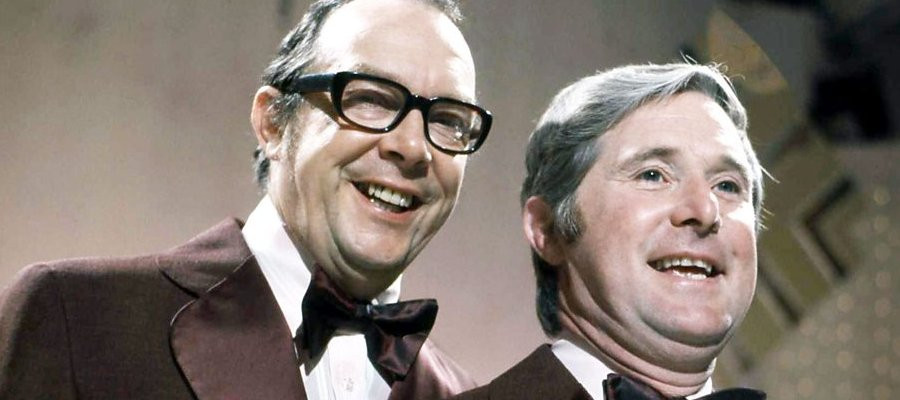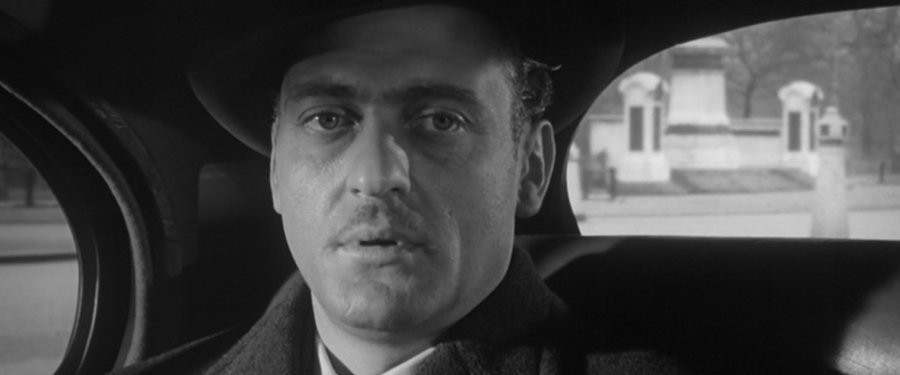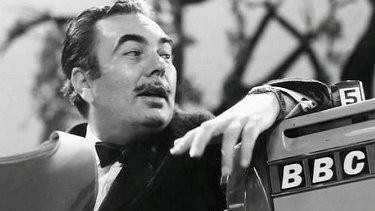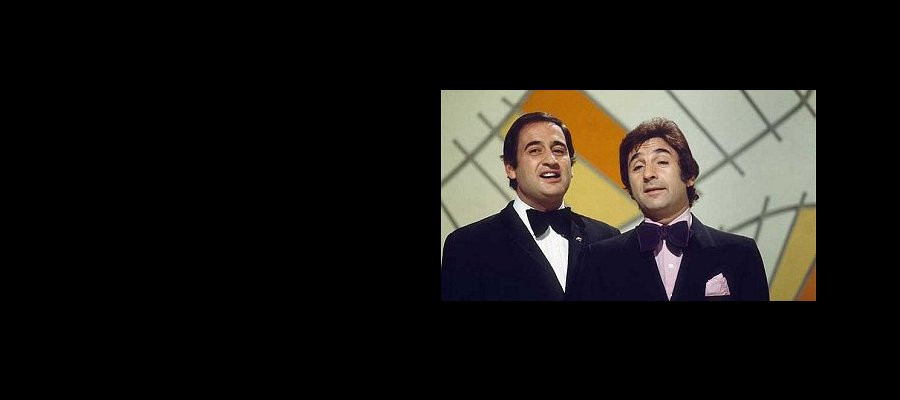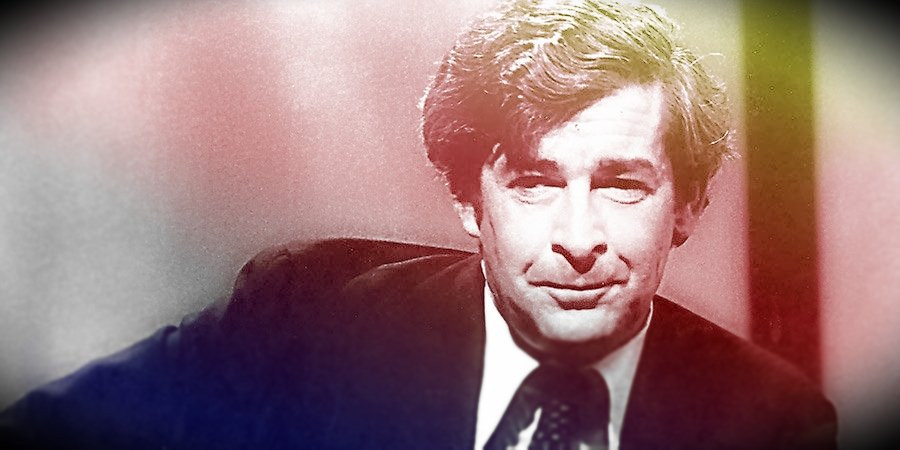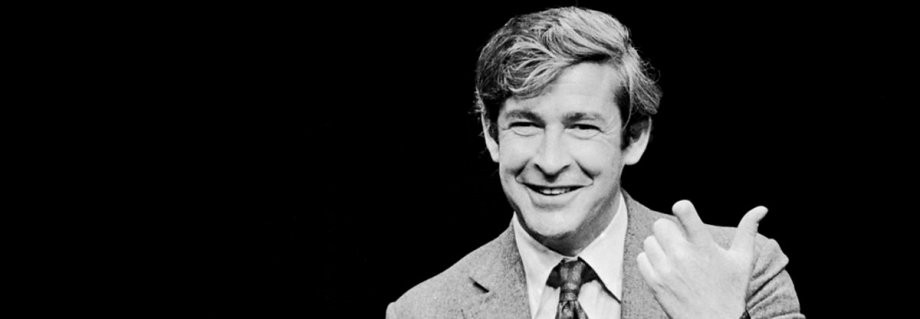
Dave Allen
David Tynan O'Mahony was born on 6th July 1936 in Dublin. He later changed his name to Dave Allen on advice from his agent who felt that his given name was 'unpronounceable'. However, that didn't hold back other members of the O'Mahony family of whom his grandmother, Nora O'Mahony edited Freeman's Journal, a publication that could boast W.B. Yeats among it's contributors, and his cousin, Eoin O'Mahony, a respectable barrister and something of a wandering scholar, who was affectionately given the nickname of 'The Pope', because one day when he was asked what he wanted to be -that's what he replied.
David remembered his father, Gerard, the Assistant Manager of the Irish Times as a very warm man, 'a cuddler', David later recalled and his mother, Jean, as a good housekeeper who always ensured that their home was well-kept and clean, 'a real home', as David described it. Like the other boys of his parish, David became an altar boy but early on discovered something of a rebellious streak in himself that led him to being something of a prankster and practical joker as well as an inventive and imaginative child. But he remained, in spite of his antics, observant and considerate.
David and his father were very close and the boy looked up to the father with a great sense of humour and a gift for mimicry, and positively doted on him. So it was a terrible blow for David when his father died on 19th April 1948 and he missed his father profoundly. His death also meant that David, his mother and his two brothers, Peter and John, had to struggle for a while with money becoming scarce.
Jean decided to start dress designing in order to earn enough to put her boys through college and eventually Peter went to work as a junior reporter in Drogheda, and John joined Independent Newspapers on the commercial side. At the age of seventeen David was taken on to the staff of the same newspaper group in the circulation department before going to join Peter in Drogheda. By now John had moved to England and eventually David followed him. In 1955 he joined the staff at Butlin's holiday camp at Skegness as a holiday host and entertainment officer -known to all of Butlin's holiday-makers as Red Coats. He was paid less than ten pounds a week and for this he had to work a six-day week with meals and accommodation provided. For many would-be entertainers Butlin's was an ideal training ground as the Red Coats were expected to put on shows and entertain the campers to a very high standard. Oddly enough, David did not look forward to this and admitted much later that at first he hated going onto stage, but after a time "wild horses wouldn't drag me off."
Among the future stars who at one time joined the ranks of the Red Coat were Charlie Drake, Roy Hudd, Des O'Connor and Jimmy Tarbuck. David joined up with a Red Coat called Al Page and together they performed a double-act. This went down so well that they continued the act the following holiday season at Filey Holiday Camp in Yorkshire. The rules for Butlin's entertainers were very strict and the owner, Billy Butlin, would often visit camps personally to ensure that these were adhered to rigorously. Cleanliness was high on his list of priorities, not just in the sense of camp hygiene but also in the material his comedians were allowed to use. Jokes about sex, politics and religion were banned and foul language from a camp member would result in instant dismissal.
It was David's brother, John, who encouraged him to make show business his career during that summer season at Filey. John felt that the relaxed, warm and intimate persona that his brother projected on stage, managed to get him laughs even when the material was not of the highest quality. After three years at Butlin's David and Al Page turned in their red coats and began to tour around small clubs as a continuing double-act, but after a couple of months David decided to go it alone and the duo parted amicably. But he found that the English had a great deal of trouble in pronouncing his name, O'Mahony, and so on the advice of his agent he changed it. He chose Allen because his agent had no one else on his books with a surname starting with 'A', and figured that in the alphabetical index this would put him top of the list.
Audiences took to the newly named Dave Allen's act and he began to work his way up through appearances at seaside strip shows and as a warm-up man for musical acts appearing at that time with Helen Shapiro, a young thirteen year old who had topped the British charts and, at their first theatre performance in 1962, an upcoming Liverpudlian group called The Beatles. His agent went to see him at the New Theatre, Oxford on the recommendation of Sophie Tucker, with whom he'd accompanied on a short tour of South Africa, and instantly signed him up for an eight-week tour of Australia. All the while David's material was improving and Tucker, already a showbiz legend, predicted that he would be a big hit in Australia.
He may have been lacking in a little self-confidence about the daunting task of getting across to a different type of audience in a different country but as he got further into the tour that confidence was boosted by a warm reaction to his act. But it was his first television appearance that cemented his success. As part of the tour he was booked onto BTV 9's In Melbourne Tonight -and at the risk of uttering a clichè, he became an overnight success. A huge postbag arrived at the TV station the next day addressed to 'Dave Allen' and newspaper critics took an instant liking to him as well, with one critic writing: 'Dave Allen makes people feel as if he's interested in them. To many, many people this is more important than oily charm.'
David continued his tour of Australia and towards the end of the eight-weeks returned to Sydney where a life-changing opportunity was awaiting him. Channel 9 were so impressed with David that they wasted no time in offering him the opportunity to host a late-night show on Thursday's which would contain humour, singing, dancing and interviews and would be tailored to his particular talents. He jumped at the opportunity.
The Tonight Show became an instant success. David wasn't interested in interviewing pop or movie stars who had their latest release or a new book to plug, but instead went for societies eccentrics such as the man who electrocuted his fruit-trees to make them grow faster or the reformed alcoholic who had taken to writing the word 'Eternity' everywhere after finding God. But David never sent these people up and always listened sympathetically to them. And he was a risk taker. He would get involved with many of the specialty acts or stunts that were part of the show. On one occasion he began bouncing feverishly on a trampoline only to suddenly shoot out of camera view. When the camera finally located him viewers saw, to their horror, their beloved host lying motionless on the floor. Two women in the audience fainted and the channel was deluged with phone-calls from concerned viewers as TCN officials rushed the unconscious Dave Allen to hospital. Later that evening an announcer broke into the succeeding film to tell viewers that he had regained consciousness and was all right.
In 1963, following two appearances on his show David was romantically linked to the singer Eartha Kitt. David had always guarded his private life from the press much to their consternation, so when he and Eartha were seen in public holding hands, the media had a field day. Rumours were fuelled by the fact that David was soon to take a trip to the US by way of London and an appearance on the prestigious Sunday Night at the London Palladium. David appeared on the same bill as The Beatles and received rave reviews, which was an achievement in itself as all the press were geared up to reporting on the 'Fab Four's' bill-topping appearance.
On his return to Sydney, David assured anxious Channel 9 executives that he had no intention of quitting his show for the lure of fame and fortune in the UK. Then in January 1964, at a friend's late-night party he was introduced to an English actress, Judith Stott. Within a few weeks David and Judith had embarked on a whirlwind romance and on 9th March they were married a private ceremony. But Judith was reaching the end of her tour of Australia and wanted to return to the UK where she had a son from a previous marriage. By early December of that year David could not bear the anguish of separation any longer and informed TCN 9 executives that he would be returning to England. He was genuinely sorry to be leaving Australia but he and the TV company parted amicably. 'Dave will not be easy to replace,' they said in a press statement, 'the whimsical Irishman has won an unprecedented audience in our viewing area.' Dave Allen returned to the UK before the end of the year with no idea where he was going to be employed next.
For the first six months David contented himself playing the cabaret circuits until an offer came from Bill Cotton, then head of variety on BBC television. Cotton thought that David would be ideal to fill a four-minute comedy spot on the new Saturday night Val Doonican Show. Previously, the idea was that Doonican would employ a different comedian every week to fill the slot, but Cotton's idea to make David a resident artiste received the full backing of both the show's star and his producer Johnny Ammonds. The thirteen-week series was an immediate success with viewers and pulled in a huge audience.
By Christmas of 1965 Dave Allen was a familiar face on British TV and through his appearances on the Val Doonican Show was picking up a large following. Bill Cotton was already preparing to offer him a longer six-minute slot on the next Val Doonican series. On the cabaret circuit David was beginning to expand on some basic themes such as life, death and religion, and was quickly earning a reputation as not so much as a stand-up comic but as a funny storyteller. In July of 1966, David received an eleventh hour call from anxious TV executives who were preparing to broadcast The Blackpool Show with resident host Tony Hancock, when the star had been taken ill. David stepped in at a moment's notice, totally unrehearsed but gave a performance that seemed as natural as if he'd been doing the show for months. It led to Lew Grade offering him the job of resident host on the Sunday Palladium show. David turned him down.
David's reason for turning down Grade was that he didn't feel as if he was ready for it yet, and wanted to remain a performer. "Dave Allen was a natural wit with a unique way of telling a joke." Lew Grade later said of the star. "Off-camera I liked him as a person from the beginning. He was amiable and did not try to be funny. He had, what I liked to call, star quality." In any event, Grade was prepared to wait for his star and was obviously not put out by his refusal because in 1967 he was host of the Palladium Show and also that year Independent Television announced that he was to star in Tonight with Dave Allen.
The new programme made newspaper headlines, not least of all because it was to replace the hugely popular Eamonn Andrews Show, a late night show that went out at 11.05pm on a Sunday. Andrews was reckoned to be a hard act to follow and many critics, aware of David's success in Australia, watched with interest to see if he could recreate the same achievement in the UK. The show opened to mixed reviews. Despite this it quickly rose in the ratings to be popular viewing for a late Sunday night audience. ITV announced that the show would return for a second series. However, early in September 1967 there was a change of plan.
ITV decided to switch the popular Frost On Sunday from its regular prime-time slot with the next series of the Dave Allen Show. Frost would be relegated to 10.55pm in the London and the North, and be recorded for a Monday screening in the Midlands and Yorkshire. Although the David Frost show had been losing viewers on a weekly basis, there may have been more to this move than meets the eye. Behind the scenes Lew Grade was having something of a power struggle and was successfully re-establishing his authority. One of those who opposed him was David Frost who was a major shareholder in the newly formed London Weekend Television. Lew had always proved in the past that he had a great instinct for public taste and put on shows that viewers wanted to see, and with his great track record nobody was in a position to disprove him. Not even David Frost.
The newspapers were quick to pick up the story, reporting 'Dave Allen Freezes Out Frost'. But Dave Allen was having none of it and went back to ATV and told them he didn't want the switch. He explained that his show had been specifically tailored for late night viewing and he wasn't prepared to change the format to cater for people watching earlier in the evening. When he pointed out to ATV that he had signed a contract for a late night series, the network dropped their plans and let David have his way. But it would be the last series he did for Independent Television for some time. In 1969 he was made an offer of a BBC television series by the Corporation's head of light entertainment, Tom Sloan.
Sloan approached Ernest Maxin and asked him if he would like to direct Dave Allen and Maxin replied that he'd been trying to do a Dave Allen comedy series for years. The new series was made up of singing, dancing, comedy sketches and Allen's own solo spot. The series was a great success and David was soon handed a contract to make another series to be called Dave Allen At Large for BBC2. The series was to be produced by Peter Whitmore and between them, Whitmore, Allen and scriptwriters Austin Steele and Peter Vincent, decided to try a new approach to the show. Sketches were to be pre-recorded on film instead of being performed in the studio and David would face the audience whilst sitting on a stall and telling his stories. Bill Cotton, the BBC's head of variety worried about the new format and informed Whitmore that sketches had to be performed live in the studio. Anything else was a recipe for disaster. As it was Whitmore ignored his bosses wishes and went ahead with the planned format.
When the series was screened on BBC2 the critics heaped praise on it finding David's story-telling hilarious and the new technique of using the filmed sequences an exciting innovation. In spite of Dave Allen's reputation for controversial material this first series took great pains to avoid anything crude or vulgar. True, he did take a side-swipe at religion and other sacred subjects but the only complaint that the first show had was not from a viewer. It was from Billy Cotton. Cotton had gone to the studio to see the recording of a sketch in which David was dressed in a Bishop's robes. The Bishop is reading aloud in a deep voice a prayer from the Bible and as he comes to the end of it an altar boy, standing close by, slams the book shut. From the look on his face it is quite clear that the boy has caught a very sensitive part of the Bishop's anatomy in the book. At this point the Bishop lets out a very high-pitched 'Amen!' Cotton was worried that the sketch would cause offence, even though he thought it was hilariously funny. He ordered Whitmore to remove it from the show -which he did. For three weeks. Whitmore waited until a night when all the BBC top brass were attending the BAFTA Awards -and put the sketch back in. There wasn't one single complaint from viewers.
Over the course of that first series there were some complaints. Some viewers took exception to David making jokes about the Pope, God and religion in general, but compared to the 10 million viewers a week the show was pulling in, a record for a light entertainment show on BBC2, the number of complaints were negligible. Although the format for Dave Allen at Large became such a huge success on BBC TV its roots were laid on ITV. Between the earlier BBC Dave Allen Show and the 'At Large' series, David made a one-off for Thames Television called Inside the Mind of Dave Allen. This came about after David approached ITV with the idea to do a show that didn't involve guests or dancing girls and just involved him chatting and doing sketches. The 60-minute show was broadcast on 8th July 1970 and was written by David, Bill Stark and Chris Hughes. The only other performer to receive a credit was Bob Todd. The critics panned the show and ITV lost interest in talking about contracts. Less than a year later virtually the same format was employed by the BBC and became a massive success, illustrating that comedy definitely is all about timing.
At the same time that Dave Allen at Large was airing on BBC2, David was engaged to play the Talk of the Town in London's West End. Opened in 1958 by Bernard Delfont, brother of TV mogul Lew Grade, the Town was London's premier entertainment nightspot. David saw this as an ambition fulfilled as to work at the Town meant that he took to the same stage as some of the world's greatest cabaret performers, including Vera Lynn, Shirley Bassey and the great Judy Garland. In 1972 David took his first serious dramatic role in Edna O'Brien's new play, A Pagan Place, which was put on at the Royal Court in London. David received good reviews for his performance as Dr. Daly, a sombre but wise medical man, but it was 16-year old actress Veronica Quilligan who stole all the notices. But not everyone was complimentary about the play and the Irish Times gave it a particularly damning review using phrases such as 'monstrous boredom and vulgarity'. David had hoped to return to his native Ireland with the play but in the event it was turned down by the Dublin Theatre Festival. Despite the mixed reviews, A Pagan Place enjoyed a successful run at the Royal Court and by January 1973 the third season of Dave Allen at Large was ready to go out on BBC2 where it remained as popular as ever.
By now the series had become a little more daring and there was very little that David was not prepared to joke about, the Pope, God, the Church, sex and drink all got the Dave Allen treatment. But it wasn't until series four, which began in February 1975, that David got into trouble with the Church. It arose out of a sketch in which David, dressed as the Pope, did a striptease on the steps of the Vatican. At Northwich, Cheshire, five hundred parishioners signed a petition criticizing the shows continually irreverent treatment of the Church. Father John O'Sullivan of St Wilfrid's Roman Catholic Church said that after a number of complaints from both Catholics and non-Catholics about the content of the series he decided to watch it himself. When he saw David disrobing his papal vestments to the tune of 'The Stripper' he was absolutely appalled and phoned the BBC to voice his protest. Later still, nearly 200,000 Catholics in the northwest joined a viewers' protest to the BBC and boycotted future shows by the Irish comedian. The newspapers were quick to latch on to the story, and a few of them contacted high-ranking churchmen in London who said that they had not been offended by the sketch and, indeed, had laughed along with the rest of the country. The Rt Revd Charles Henderson, Auxiliary Bishop of Southwark, stated, "I do not object to jokes about the Church. If we can't laugh at ourselves-God help us." This didn't stop Tom Elwood, a Northwich primary school headmaster, from launching a campaign to get Catholics in the Shrewsbury diocese to complain to the BBC. The Evening Standard, London's biggest selling newspaper, phoned the Vatican for a comment and were told by a spokesman, "We do not object to jokes about the Roman Catholic Church as long as they are in good taste. People must not be too sensitive about that. We like to think we have a sense of humour."
In May David returned to Australia to film four shows for the ATN 7 network, for which he was paid $100,000, which at that time made him one of the highest paid performers on Australian television. Australian's it seemed had not forgotten him and his pulling power remained enormous. He had returned home and was on tour when news came through that a compilation show of Dave Allen at Large had won an award at the Golden Rose of Montreux TV Festival in Switzerland. In Norwich his one-man show, An Evening with Dave Allen, set a new box office record for the Theatre Royal, when £21,876 was taken for six sell-out performances. He was at the height of his profession and America beckoned. David was not widely known in the USA. His television series had only gained syndicated exposure in New York, so he was opening on Broadway with a distinct disadvantage. But his show had attracted New York theatre critic Clive Barnes who, upon seeing the Broadway show, went away and wrote a review headlined 'It's David The Killer Comic.' Barnes went on to enthuse about the comedian's one-man show but warned potential theatregoers that they might possibly be offended by the comics sense of humour 'particularly as to how you regard irreverent and, I suppose the word is explicit, satire about sex, bodily functions and religion in general.' Barnes was one of the most influential critics on Broadway, but other critics did not echo his sentiments. Some lambasted the show and audiences did not pack the theatre.
On returning to England, David continued his one-man show and unlike his American experience, these did play to packed houses. In his private life his marriage to Judith was coming to an end and his brother John had a serious alcohol problem which, left untreated, would probably end up in his death. David did everything he could to help his brother, but John's condition continued to worsen. He was now drinking heavily and was out of work. Eventually he ended up in a single room in St Mungret's Hostel in Earl's Court. In early January 1986, John Tynan O'Mahony was found dead after a fall from a fifth storey window. The inquest into John's death also revealed that he had a rare form of duodenal cancer, which would have killed him within two years. David knew nothing of this. Following the death of his brother, David took off on another tour of Australia and upon his return continued with his one-man show. But he hadn't done a new TV series since Dave Allen at Large had finished in 1979 and contented himself with a series of occasional specials. So it came as a surprise when it was announced in January 1990, after an absence from television of four years, that David would make a new six-part series for BBC1. To those who hadn't seen him for many years his appearance had changed considerably. He was now 53, had a head of grey hair and was carrying a little more weight. But he made it quite clear that he was looking forward to his TV comeback and joked on the opening show, "I retired. I'm still retired, but in order to keep myself in retirement in the manner in which I'm accustomed, I have to work. It's a kind of Irish retirement."
The first show was scheduled for Saturday 6th January 1990. It was quite clear from the 10pm start time that the series would be squarely aimed at adults. The show was pre-recorded and then edited down to thirty minutes duration. It was just David talking to the audience about a variety of subjects but there were no supporting guests or sketches. The trademark chair was still there, but he stood up the whole time. His monologues took in his usual pet subjects as well as jokes about birth, advances in television technology, food and ageing and he delivered each punch line with his usual wit and expertly honed comedic timing. Time, in fact, was the subject of his last joke, in which David spoke of how our lives are ruled by time and how we have become a nation of clock-watchers. "We spend our lives on the run;" he said. "You get up by the clock, you go to work by the clock, you clock in, you clock out, you eat and sleep by the clock, you get up again, you go to work -you do that for forty years of your life and then you retire -what do they f***ing give you? A clock!"
The show had hardly finished before the BBC switchboard began to light up with a flood of viewers complaints. The BBC defended David saying that the use of bad language was within the context of the show and that the late-night broadcast time were all factors in their decision to broadcast it with the expletive. Allen was unrepentant but the storm continued into the following week with MPs standing up in Parliament to comment on the BBC's lack of control and poor taste. The newspapers had a field day bringing up every instance of controversy in Dave Allen's TV career, including the Pope/stripper episode. The following day the BBC were forced to issue an apology admitting that a warning should have gone out before the programme about the strong language. Following the six shows on BBC television David disappeared from the screen once more returning briefly to help launch Carlton, the new ITV franchise. Filmed live at the Mermaid Theatre in London, a little older, a little more angry, and filled with a succession of uncensored tirades, David's new series, simply entitled Dave Allen was not as successful with viewers as previous shows but nevertheless won him the Best Comedy Performer honour at the British Comedy Awards. But that was to be the last time television viewers saw Dave Allen in a series of his own. In semi-retirement, he made the occasional chat show appearance, and presented the six-part The Unique Dave Allen for the BBC in 1998 and the following year he quit performing, (his last interview being on Radio 4 in 1999) to concentrate on his hobby as an amateur artist. He first exhibited his work in 2001 to raise funds for Marie Curie Cancer Care. He quit his 60-a-day smoking habit in the eighties, saying: "I was fed up paying people to kill me." Offers of stage and TV work still continued to pour in and rumour has it he was considering a new television project for late 2005. He once quipped: "You spend your whole life working to a point where you don't have to work. When you reach that point, people say, "Why aren't you working?"" But on March 10th, aged 68 years, Dave Allen died in his sleep.
Survived by his second wife Karin Stark and by his three children, tributes soon came flooding in for the suave Irish comic who was famed for the monologues and his frequent goading of the Catholic Church. As writer Paul Clark correctly pointed out in a tribute to him in The Stage: 'His influence and success on TV ensured an audience for irreverent revues like Not The Nine O'Clock News and The Day Today. Without him there would have been no royal bashing on Spitting Image, no religious humour and possibly no Father Ted. The quickfire social satire of Little Britain owes everything to the short, sharp, visual skits of Dave Allen at Large. His influence is everywhere.'
BBC's Alan Yentob paid tribute to David, saying: "There was no one quite like him - the stool, the smile, the cigarette, the hand gesture, the slow burn. He was a master storyteller."
The BBC's head of comedy Jon Plowman said, "(he) tried to show the hypocrisies of the world as well as its funny side".
Comic and writer Barry Cryer said: "Like all the good comics, he was a perfectionist - he wouldn't settle for anything less. I watched him develop, from his days on The Val Doonican Show to becoming a storyteller, delivering his polemics. He was so serious and committed, but he proved you could be serious and funny."
And Late Late Show presenter Gay Byrne, who interviewed David on several occasions, said he admired Allen's delivery style. "He was a tremendous observer of the idiocies of life and brought them brilliantly to the screen and the stage,"
Interviewed once, Dave Allen said he'd like the following engraved on his tombstone: "Don't mourn for me now, don't mourn for me never - I'm going to do nothing for ever and ever."
David Tynan O'Mahony - Goodnight, God bless and may your God go with you.
Published on February 20th, 2019. Written by Laurence Marcus (2005) for Television Heaven.


